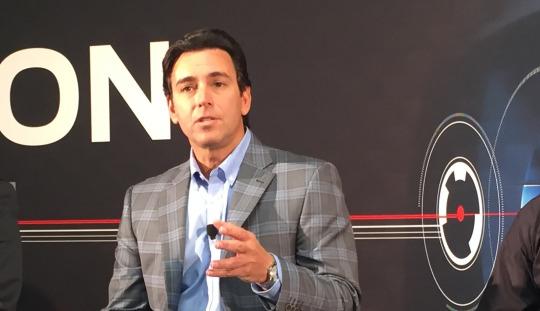The Ford GT. I’ll drive this car any day.
Mark Fields, the new CEO of Ford, paid a visit to the nerd journalist corps last week. He visited Ford’s Research and Innovation Center in Palo Alto, Calif. While his people were showing off the new Ford GT (quick review: holy wow) and weird plastic springs the company will be using soon to save weight in its cars, I got a chance to spend a few minutes with him one-on-one.
From my perspective, one interesting threat to the status quo of car companies is autonomous vehicles. Self-driving technologies could rewrite the car business.
Fields, of course, says he sees new technology as an opportunity.
For people who want self-driving cars, Ford will eventually offer them. For those who like to drive, that’ll stay an option. “We will offer a full line of autonomy levels,” he told me. He emphasized that, at least in our lifetimes, Ford cars will always offer their owners the capability to drive. If they want it.

Ford CEO Mark Fields at the Ford Research and Innovation Center in Palo Alto, Calif.
“We don’t see a disconnect,” he said. “We don’t see driving and autonomy as exclusive.” He said Ford will continue to work on making cars that are “both fun to drive and fun to ride,” and that “there will always be a spectrum of autonomy in our lifetime.” (To calibrate that statement: Fields is 54.)
However, during an earlier presentation at the Research Center that day, Ford execs discussed the challenges of building cars that are safe to drive in spite of the advancements in self-driving technology. The problem isn’t just that technology can distract drivers from operating their cars safely. There’s also the reverse problem: If cars are too autonomous and thus too boring to pay attention to while they are driving, the human “driver” might not be paying attention when he or she needs to take over.
For this reason, Google has proposed taking the driver out of the loop completely in its prototype self-driving pod cars. There’s a big red emergency stop button, but no steering wheel or pedals
. There’s no way the driver/passenger can make a bad decision and screw things up, and the car’s programmers don’t have to account for unpredictable humans trying to take control.
Fields also sees electric propulsion gathering steam, as it were. While he wouldn’t predict when (or if) electric cars will become mainstream, he did say that Ford will continue to offer more options. “Our approach is to offer choice,” he said.
The Uberization
Another fundamental threat to the future of the car business is the changing nature of car ownership. Fields sees this. “A certain population wants access more than ownership,” he said. And Ford, ultimately, is not a car company per se. “We’re a mobility company,” said Fields.
Ford is running 25 experiments around the globe, he said, working on things like “usership” instead of ownership, and using social collaboration tools to help people find cars to get them where they are going. “We are trying to solve big societal issues,” he said.
(One cool technology Ford is working on, that sounds like a Silicon Valley fantasy: The ability for cars to recognize open parking spaces they pass by, and then transmit this data to a service that tells other cars, whose drivers are looking for spots, where one is near them.)
Too much tech?
My big fear, when it comes to automotive technology, especially from a company that’s newly trying to recast itself as a service company, is that its services will know a bit too much about their customers: Where they are, who they may be with, and what they are doing in their mobility devices.
Fields didn’t quite have an answer for this, but he did have a line at the ready. “We are committed to being trusted stewards of customer data,” he told me. “We have to ask the customer whether they want to opt it.”
He told me the customer has to see a benefit of sharing data. For example, a car that knows it needs an oil change could help its owner schedule the service.
But what about insurance companies who give you better rates when you opt in? Won’t they eventually make keeping your driving data private unaffordable? Or overeager courts, or police, who absorb data under arguably legal, but questionable pretense?
Just as it is for online companies and mobile phone companies, stewarding customer data is tricky. Especially when customers seem to be so eager to expose so much data in return for, usually, incremental value.
Call it usership or ownership or whatever you like, but technology is changing our relationship with nearly every facet of mobility. Ford may indeed remain a “Big 3” auto maker for the foreseeable future. But it’s also possible that technology will drive new companies to prominence, just as it has for nearly every other industry on the planet.

No comments:
Post a Comment